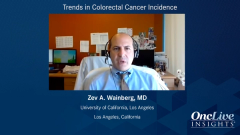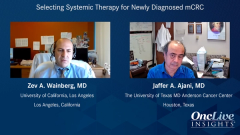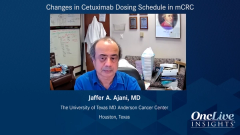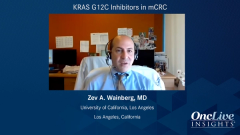
Supplements and Featured Publications
- My Treatment Approach: Colorectal Cancer
- Volume 1
- Issue 1
Next-Generation Sequencing in Metastatic Colorectal Cancer
Drs Jaffer A. Ajani and Zev A. Wainberg comment on the rationale for conducting full next-generation sequencing panels on patients with metastatic colorectal cancer and explain how to best utilize information provided to inform treatment decisions.
Episodes in this series

Zev A. Wainberg, MD: Regarding NGS [next-generation sequencing], everybody has a different preferred panel. A lot of times when I have a patient who has a KRAS mutation, I find the full NGS panel not to give the kind of high yield information I would otherwise like. But you’re right, there are some rare fusions, whether it’s NTRK or whether it’s the rarer patients who we’re only going to pick up on through NGS. In your institution, do they routinely send for a full NGS panel even after documentation of a RAS mutation?
Jaffer A. Ajani, MD: This is not absolutely routine. It’s being done more and more, and our NGS panel is expanding. That doesn’t mean it’s going to be more helpful, but I you’ll at least get more information. It is being done more commonly because, especially when you do primary surgery, you’ve got lot of tumor tissue that you can process. That doesn’t mean it’s totally representative of the metastatic disease, but you get a lot of information from the primary tumor.
Zev A. Wainberg, MD: It’s moving away from a la carte testing to just get a full NGS panel on everybody, and for the community oncologists, it tends to be harder to do that sometimes. But I do see more and more referrals coming in already having had a full NGS panel, even in first-line metastatic colon cancer. As the cost goes down and the accessibility increases, we suspect those trends will increase. It’s particularly true in young patients to be fair, where even if the data don’t necessarily suggest a distinct molecular phenotype, there is the tendency to want to look for every last rarest of mutations that may be of relevance down the road.
Jaffer A. Ajani, MD: You will expand on this, but also the germline Lynch syndrome, particularly, is important in colorectal cancer, MSI [microsatellite instability]-high patients, and so on.
Zev A. Wainberg, MD: Yes, and I do think that in many GI [gastrointestinal] cancers now, we’re learning that, also with very limited costs, it’s worth doing a multicancer genetic panel in colorectal cancer, where Lynch syndrome is relatively easy to diagnose nowadays. But for patients who are young, we should be testing for a more hereditary gene panel. I had a patient not long ago with colon cancer who had a BRCA mutation, and it was only picked up with a limited family history of cancer. Colon cancer is not one of the first ones you think about when you think about BRCA, but certainly this patient had one, and there is an increased incidence in BRCA carriers, albeit smaller of colorectal cancer. There’s little downside to doing these things nowadays, I completely agree.
Transcript Edited for Clarity
Articles in this issue
over 4 years ago
Anti-EGFR/Chemo Combos Allow for Tailored Approach in mCRCover 4 years ago
Biweekly Cetuximab Offers a Convenient Dosing Option in mCRCover 4 years ago
Genomics, Sidedness Guide Treatment Selection in Metastatic CRCover 4 years ago
KRAS G12C Inhibitors in mCRCover 4 years ago
Future Directions in mCRCover 4 years ago
EGFR Therapy for mCRC: Dermatologic Toxicityover 4 years ago
Later-Line Treatment Options for mCRCover 4 years ago
Sequencing Anti-EGFR Therapy in mCRCover 4 years ago
Changes in Cetuximab Dosing Schedule in mCRC














































